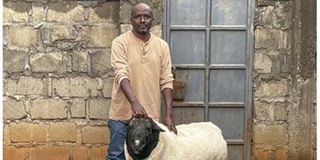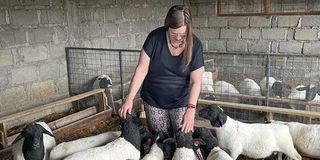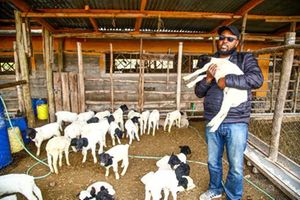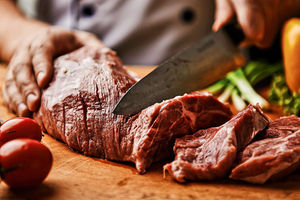
James Kahiga with a ram at his Capri Dorper Sheep Farm in Nyandarua.
After 14 years as an auditor on Wall Street in the fast-paced financial environment of San Francisco, James Kahiga sought a more meaningful and fulfilling life. He flew back to Kenya and moved to the agricultural landscapes of Nyandarua to dedicate his life to raising Dorper sheep.
The move was more than a change of career. It marked Kahiga's commitment to modern agriculture.
In 2008, he married Beth Ann, who ran a non-profit organisation. They realised that their high-pressure lifestyle in the US was causing them considerable stress. Determined to find a more serene existence for farming, they set their sights on Kenya.
"We started research into farming opportunities in Kenya. Despite my background in finance, I had a passion for sheep rearing. I bought three sheep at the age of 14,” he says. “Though this first endeavour failed, it offered valuable lessons, particularly regarding the importance of investing in one’s future.”
Initially, Kahiga considered goat farming. After much analysis and introspection, he settled on Dorper sheep.
Developed in South Africa in the 1940s and 1950s, the Dorper breed is known for its exceptional meat quality, rapid growth, disease resistance and low fat content. It is a cross between the Persian and Dorset breeds and has earned the nickname 'the Angus of the sheep world'.

Beth Ann Kahiga with some of the sheep at Capri Dorper Farm. The farm in Kasuku, Nyandarua County, has 150 Dorper sheep.
Kahiga's focus on Dorper sheep was driven by a vision to innovate and meet local market needs. He enrolled in academic programmes at Michigan and Oklahoma State Universities, volunteered on Dorper sheep farms and researched best practices for zero grazing, vaccines and animal husbandry.
“One of the challenges I faced was establishing a sheep farm in Kenya while still residing in the United States,” he says.
Kahiga then made several trips to Kenya to set up the farm in Kasuku, Nyandarua County. He bought 10 sheep and hired a farmhand. Over time, he learnt the importance of being a hands-on farmer as it ensured high standards. Kahiga built pens and leased land for fodder.
After moving to Nyandarua, he bought Kenyan Dorper sheep and imported pure Dorpers from South Africa. Kahiga hired a vet to assist with vaccinations and medication. Recognising the high cost of buying feed, Kahiga decided to produce silage on site, as this was more economical than buying feed.
“Ann and I saved and invested in real estate while in the US. We also lived modestly and bought land in Kenya,” he says. “After a decade of saving, investing and planning, we had enough money to start sheep farming.”
The investment included drilling a borehole, installing solar energy systems, importing sheep and building structures on the farm. Capri Dorper Farm has 150 purebred and crossbred Dorper sheep. Kahiga ensured that his workers were trained to handle the sheep to the required standards. The farm's day starts at 5am with feeding and watering the animals. Kahiga, his wife and the farmhand also check the animals' health and administer medication if necessary. Paddocks and water troughs are cleaned and mineral blocks replenished daily. Capri Dorper Sheep Farm operates on a zero-grazing model, feeding the animals maize silage. Each sheep receives between two and five kilogrammes of feed daily, depending on size and age. They also receive mineral and salt licks.
Supplementary concentrates, including maize germ and sunflower, are provided for specific dietary needs. The growth rate of Dorpers is notably superior compared to other breeds. Pure South African Dorper lambs are three to five kilos at birth, reaching about 30 kilos in three months.
Kahiga highlights the growing demand for Dorper sheep meat in Kenya, saying a significant portion of the meat is imported. Capri Farm aims to offer pure South African Dorper sheep at competitive prices.
“One Pure South African Dorper ram goes for Sh100,000 and an ewe Sh50,000. Crossbred rams are available, with one selling for Sh50,000 while an ewe is Sh30,000. These prices are subject to periodic fluctuations,” he says.
The Kahigas have committed to supporting other sheep farmers in Nyandarua. Capri Dorper Sheep Farm promotes educational visits, which help farmers understand effective management, vaccination protocols and animal health. A visit costs Sh2,000 per person, with prices adjusted regularly.
Additionally, the couple works with animal health consultants like Dr Jacinta Mwirigi. In cases of unexplained deaths, examination of the carcasses are done at the Ministry of Livestock lab in Nakuru.









